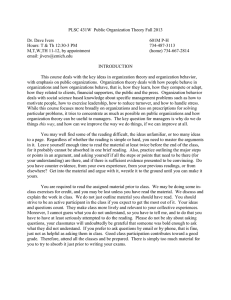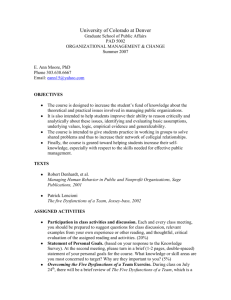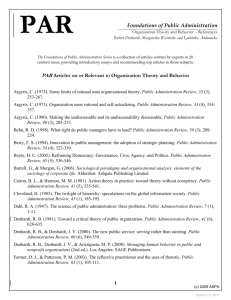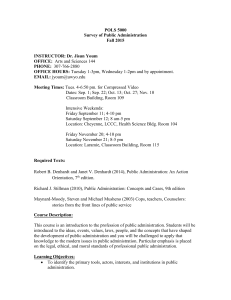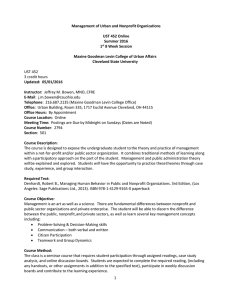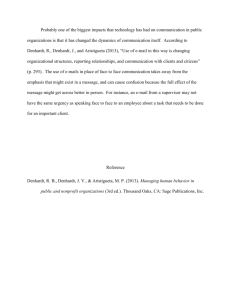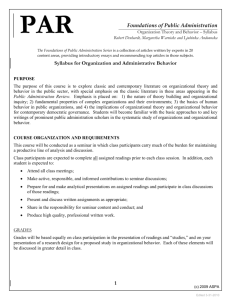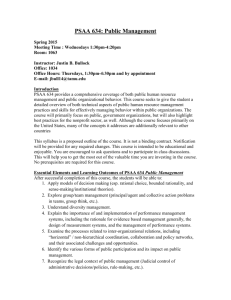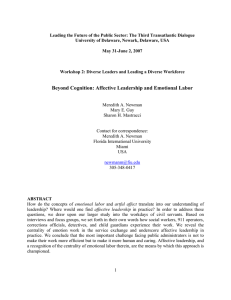PLSC 270--Fall 2013 Instructor: Dave Ivers Office: 601M Pray-Harrold
advertisement
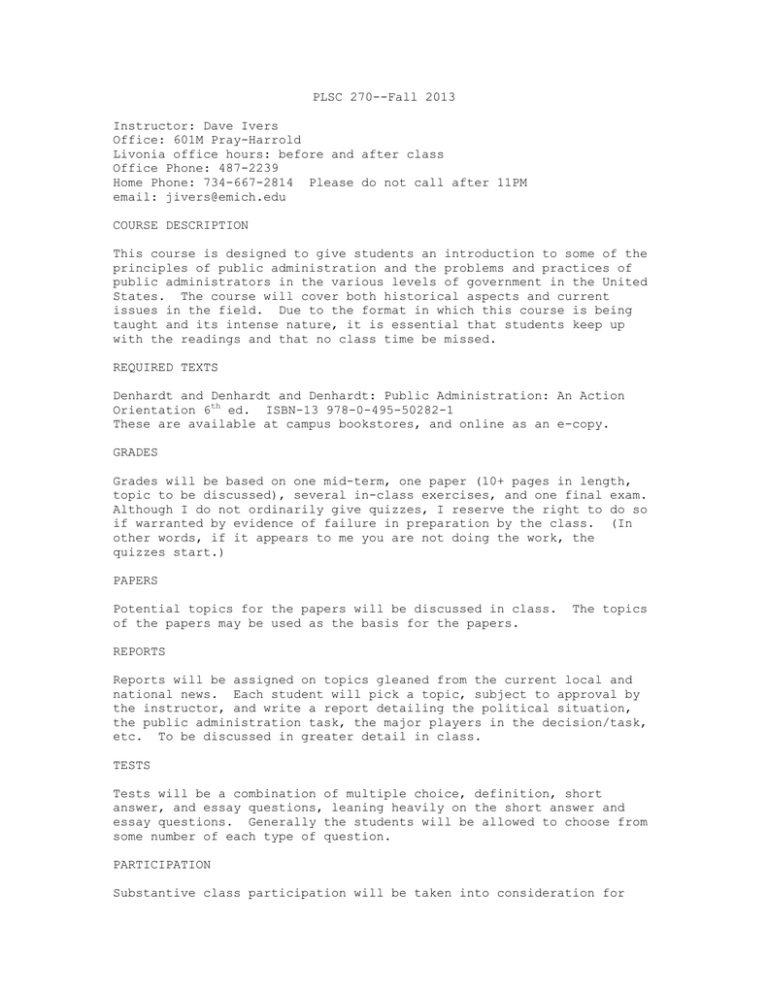
PLSC 270--Fall 2013 Instructor: Dave Ivers Office: 601M Pray-Harrold Livonia office hours: before and after class Office Phone: 487-2239 Home Phone: 734-667-2814 Please do not call after 11PM email: jivers@emich.edu COURSE DESCRIPTION This course is designed to give students an introduction to some of the principles of public administration and the problems and practices of public administrators in the various levels of government in the United States. The course will cover both historical aspects and current issues in the field. Due to the format in which this course is being taught and its intense nature, it is essential that students keep up with the readings and that no class time be missed. REQUIRED TEXTS Denhardt and Denhardt and Denhardt: Public Administration: An Action Orientation 6th ed. ISBN-13 978-0-495-50282-1 These are available at campus bookstores, and online as an e-copy. GRADES Grades will be based on one mid-term, one paper (10+ pages in length, topic to be discussed), several in-class exercises, and one final exam. Although I do not ordinarily give quizzes, I reserve the right to do so if warranted by evidence of failure in preparation by the class. (In other words, if it appears to me you are not doing the work, the quizzes start.) PAPERS Potential topics for the papers will be discussed in class. of the papers may be used as the basis for the papers. The topics REPORTS Reports will be assigned on topics gleaned from the current local and national news. Each student will pick a topic, subject to approval by the instructor, and write a report detailing the political situation, the public administration task, the major players in the decision/task, etc. To be discussed in greater detail in class. TESTS Tests will be a combination of multiple choice, definition, short answer, and essay questions, leaning heavily on the short answer and essay questions. Generally the students will be allowed to choose from some number of each type of question. PARTICIPATION Substantive class participation will be taken into consideration for those students whose final grades are on the borderline of the next higher grade. Substantive participation means that the conversation is on the topic being discussed. The best way to prepare for intelligent discussion of the topic is by completing the assigned readings before class. Grading points breakdown Mid-term Exercises Paper Final 25% 20% 25% 30% Total 100% No Grade of Incomplete will be given unless there are special circumstances deserving of such a grade. The decision on whether or not the circumstances warrant an incomplete will be made by the instructor, in due accordance of University policy. Students seeking an incomplete may be asked to provide evidence supporting such a request. In fairness to students who completed the work on time, completion of an incomplete will be different, and will be graded differently. Make-up Exams will be infrequent. As with incompletes, supporting evidence of personal tragedy, etc., may be required. Make-ups will be different than the exam missed, and will be graded differently. Late Papers and Reports will be docked 1/3 of a letter grade for each day late (yes, including weekends and even one second into the next day.). Papers and Reports are due at the beginning of class on the date due. Thus, handing in a paper one second after class starts will result in a dock of 1/3 of a letter grade. PLAGIARISM All students should be familiar with the University policy on plagiarism and all other forms of academic dishonesty. Examples of plagiarism include: Copying word-for-word from the work of an author or any other person without proper citation; Heavily paraphrasing the work of another without proper citation; Using another's concepts, ideas, or frameworks without acknowledging their contribution to your work. Copying information from the Web, especially from such sources as Wikipedia. If you are in doubt about whether a specific citation or procedure is in order, consult your instructor, another professor, or advisor. CHEATING WILL NOT BE TOLERATED INDIVIDUALS CAUGHT WILL FACE SEVERE ACADEMIC PENALTIES CLASS SCHEDULE Week 1: Intro to Public Administration. What we’re going to do. Rules of the Game. Chapter 1 of Denhardt. Week 2: right.” Politics in Public Administration. Chapter 2 of Denhardt. Why we can’t “just do it Week 3: Dealing with other organizations. Some thoughts about intergovernmental relations. Chapter 3 in Denhardt Week 4: Ethics for Public Administrators. Chapter 4 of Denhardt. Week 5: Some Theory of Organizations. to work. Chapter 5 of Denhardt. Doing the right thing. How do we get our bureaucracies Week 6: Planning, Executing, Evaluating. How do we give ourselves the best chance to “do it right”? Chapter 6 of Denhardt. Week 7: Mid-term. More to come.
